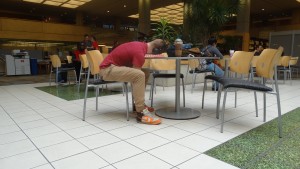Only 11 percent of American college students sleep well, according to Harvard University. College students are amongst the most sleep-deprived people in the country, which can slowly have an affect on the body and the mind. On average, college students get less than six hours of sleep per night, which can result in a condition called sleep deprivation. Sleep deprivation is when a person doesn’t get enough sleep.
“Sleep is associated with everything in your body—it’s a metabolic process. Everything that happens in your body depends on sleep to happen on a regular basis,” Anne Soltysiak, Psychology professor at Sinclair , said. She said sleep deprivation is getting less sleep than you need, and eventually can affect your health.
“You can have total sleep deprivation, which is not sleeping at all, or you can have chronic partial sleep deprivation, which means you don’t sleep enough each night. If you do it night after night, that deficit does accumulate to known health affects,” Soltysiak said.
Although, sleep deprivation does not cause mental disorders to those whom aren’t predisposed to them, many people can still be triggered briefly, according to Soltysiak. “If you’re talking about extreme cases where people go three, four, or five days without any sleep at all there are some cases where people have brief psychotic episodes, which is completely related to sleep deprivation. It’s called sleep deprivation psychosis,” Soltysiak said. Sarah Finch, Biology professor at Sinclair, said stage 3 and 4 of the sleep cycle is the restorative stage. This is the stage where the body is fixing the cells, but it’s also the brain essentially defragging itself. Similar to Finch, Soltysiak said it’s a chemical process that occurs at certain stages of sleep, which is necessary for memory formation.
“You’re making new neural connections with the stuff you learn, but you’re also taking all the sensory information from the day and getting rid of all the unnecessary information you don’t need,” Finch said.![]()
![]()
People from all walks of life experience different reasons why they are sleep deprived, according to Soltysiak. However, women seem to get less sleep than men because it is tied to their hormonal system. Although the younger you are the more sleep you need in order to have productive brain growth and memory consolidation.
“This is really important for students because you want to remember what you learned throughout the day so you can recall it later,” Soltysiak said. “If you don’t sleep, you don’t rehearse those memory circuits, and if those circuits aren’t stored, then it’s not there to be retrieved.”
Culturally, people seem to view sleep as not being a valuable part of living a healthy lifestyle.
“Devaluing the need for sleep is out there in the culture—it’s all about the fast paced lifestyle now,” she said. Soltysiak, who also teaches about drugs and behavior, said caffeinated drinks
play a role in sleep deprivation, but aren’t the main cause in this condition. Caffeine inhibits a brain chemical that is associated with drowsiness, but it’s easy to become tolerant.
“It is possible to take in too much caffeine and you get a problem called caffeinism, where you are wired,” Soltysiak said. “The real danger is that the FDA doesn’t require truthful labeling when caffeine is added to a beverage.”
Finch said we are in a society where we want a “quick fix,” but we don’t know the long-term effects of it or the chemicals we are putting in our body. One of the infamous habits of a college student is cramming and pulling an all-nighter, which Soltysiak and Finsh never recommend. “Cramming is not only bad for sleeping, but also studying,” Finch said. Soltysiak recommends students have good health habits, including study habits—put aside time every night to study because that will get you better results rather than if you cram, according to Soltysiak.
“If you study right before you go to sleep, and focus on the material and then go to sleep, the sleep following the study period will help you actually to consolidate and help store that information while you’re asleep,” Soltysiak said.
Both Finch and Soltysiak have similar views about the coordination of the mind and body. They both agree that it is clear that when you don’t get enough sleep, your brain and body won’t be working to their fullest ability.”If your physiology is not where it should be, you won’t get to those restful stages of sleep,” Finch said.
The biggest thing is to have a healthy lifestyle—you have to have sleep, have good nutrition, have aerobic exercise, because exercise feeds oxygen and glucose to your brain, and if you want to remember things you better feed your brain,”
Soltysiak said. “Also, chronic stress is something you have to cope with because if you don’t deal with your stress it will disrupt your sleep. If it disrupts your sleep, then you wont be able to remember stuff, which is probably going to stress you out—so it’s a cycle.”
Just like Soltysiak, Finch said it’s important to focus on health because it connects to sleep. She said our priorities aren’t where they need to be because we have created bad habits. Both Soltysiak and Finch said having good nutrition, hydration, exercise, stress management and sleep will help establish a healthy lifestyle.
“The quality of life is better, and you can experience new things if you’re getting these five things,” Finch said. “We need to remember we need to take care of our bodies for us to do all of the things we want to do.”
Gabrielle Sharp
Executive Editor
